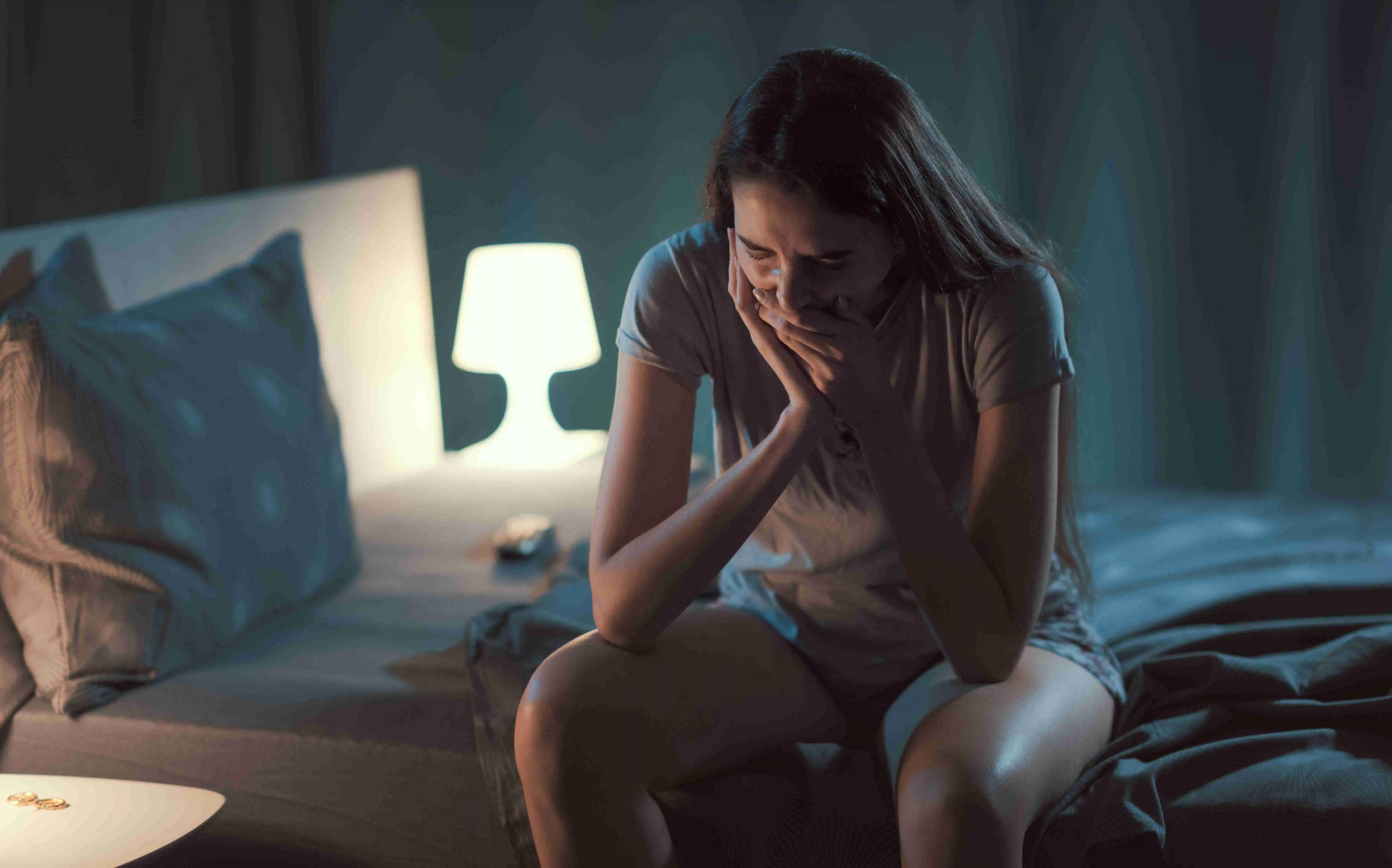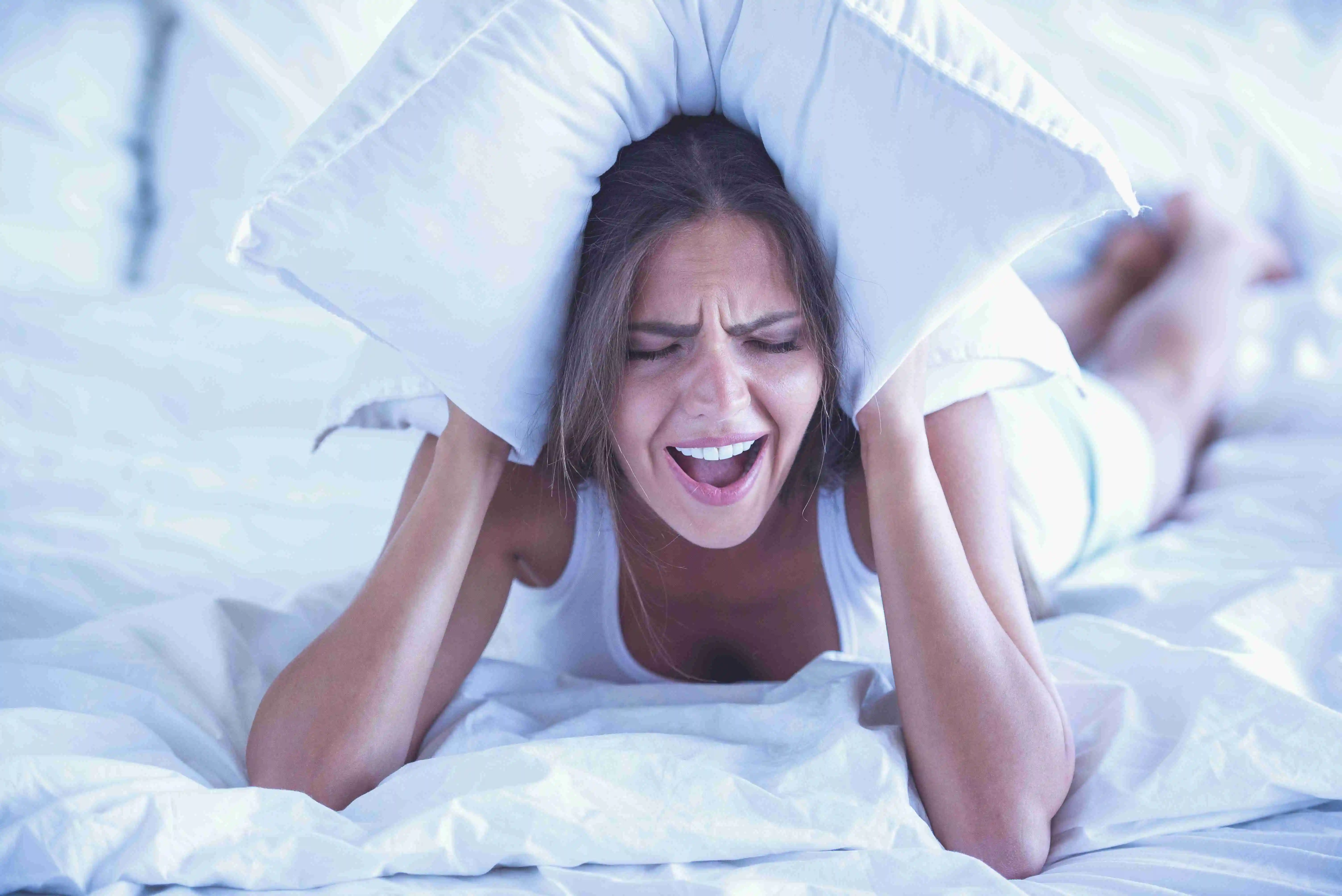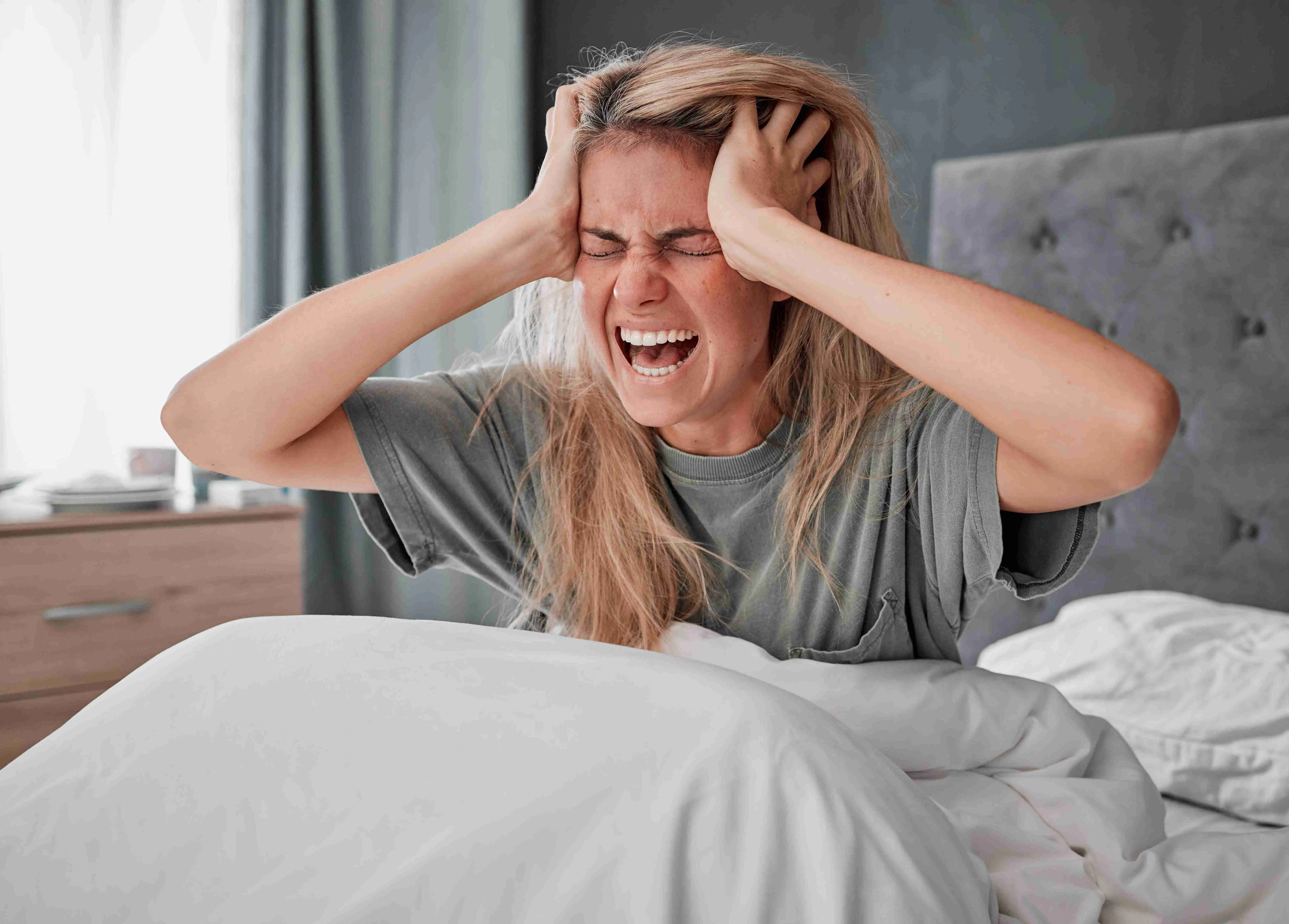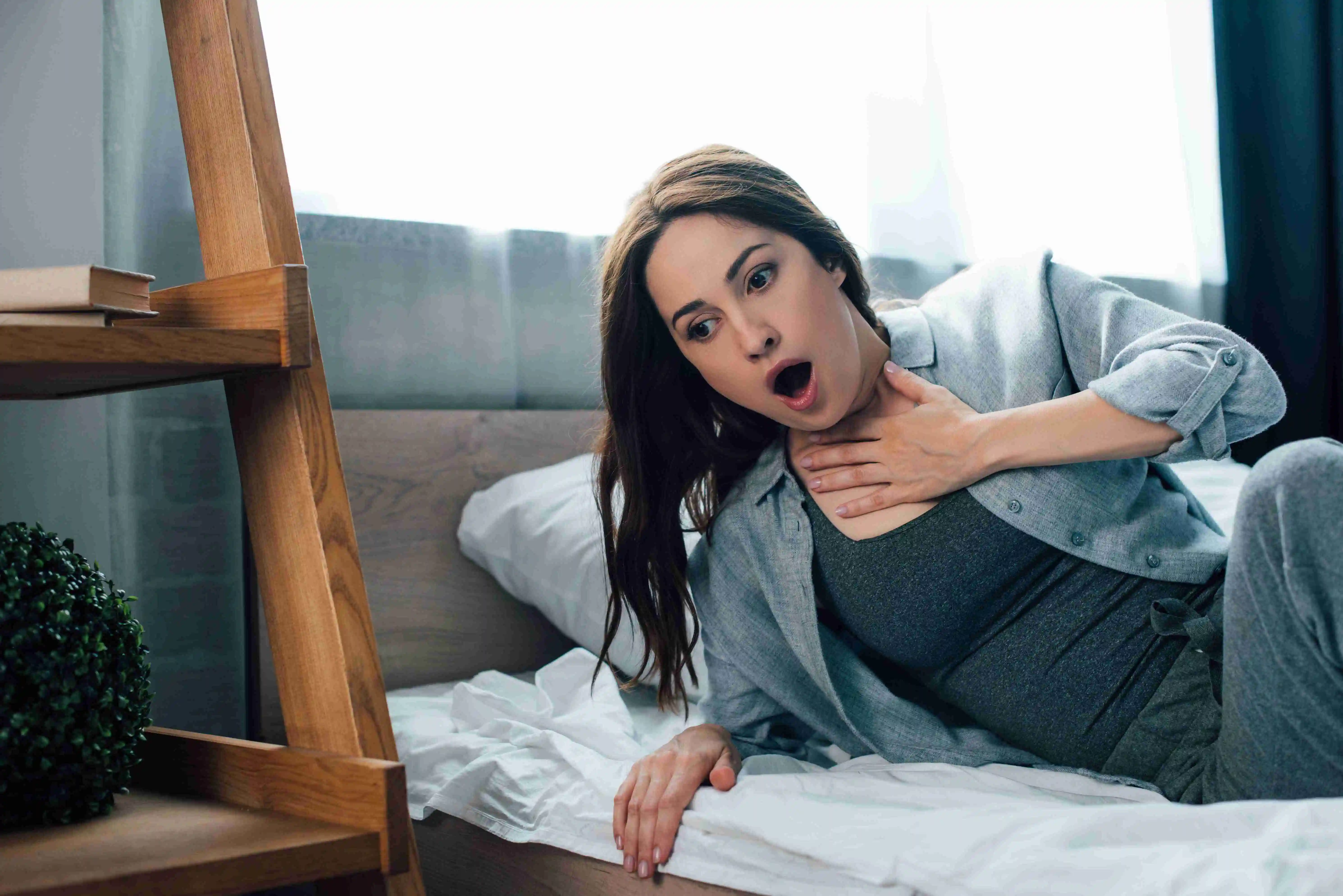
Nocturnal panic attacks, also known as night panic attacks, are a distressing and debilitating condition that can disrupt a person's sleep and overall well-being.
These episodes of intense fear and anxiety occur during sleep, awakening the individual abruptly and causing a range of distressing physical symptoms, it’s important to understand this often misunderstood condition, so individuals experiencing nocturnal panic attacks can gain a better understanding and seek appropriate help to alleviate their symptoms.
What is a Nocturnal Panic Attack?
A nocturnal panic attack is a type of panic attack that occurs during sleep. It is characterized by sudden and intense feelings of fear, terror, or impending doom, which frequently come with physical symptoms like a rapid heartbeat, shortness of breath, sweating, and trembling.
The Impact of Nocturnal Panic Attack on Sleep Quality
Nocturnal panic attacks can have a significant impact on sleep quality, leading to frequent awakenings and increased difficulty falling back asleep.
Individuals who experience these panic attacks often suffer from insomnia, as the fear of another attack occurring during the night can make it challenging to relax and drift off into a restful sleep.
- Frequent Awakenings: Nocturnal panic attacks can disrupt the natural sleep cycle, preventing individuals from achieving deep, restorative sleep.
- Difficulty Returning to Sleep: Individuals who experience nocturnal panic attacks often wake up suddenly in a state of intense fear or distress, which can make it challenging for them to calm down and fall back asleep. This difficulty returning to sleep can lead to disrupted sleep patterns and poor overall sleep quality.
- Insomnia: Because of the multiple symptoms of nocturnal panic attacks, whether they’re physical or psychological, it makes it harder to fall asleep, which in turn could lead to insomnia.
- Fear of Sleep: Constant worry and anxiety about going to bed can create a vicious cycle of negative thoughts and emotions, further exacerbating the frequency and intensity of panic attacks.
- Shortened Sleep Cycles: A nocturnal panic attack often shortens a person's sleep cycle. The sleep cycle consists of various stages, including light sleep, deep sleep, and REM (rapid eye movement) sleep. These stages are essential for the body to rest and restore itself.
- Fatigue and Sleepiness: Since individuals who suffer from frequent nocturnal panic attacks won’t be able to sleep during the night, their bodies will be in a constant state of fatigue, and that’s due to the absence of the restorative qualities of sleep.
Nocturnal Panic Attack Symptoms

The signs of a nocturnal panic attack can range from abrupt awakenings during sleep to strong feelings of fear and anxiety. These episodes can be extremely distressing for those who experience them, as they disrupt sleep and leave them feeling restless and on edge.
Physical Symptoms
- Racing Heartbeat: This sensation of the heart-pounding or beating rapidly can be extremely alarming for individuals experiencing a panic attack during sleep. Other physical symptoms, such as trembling or shaking, may also be present along with this racing heart.
- Chest Pain: Individuals who suffer from nocturnal panic attacks might feel a surge of pain in their chest, which can be very bothersome for them, prevent them from sleeping, and even cause insomnia.
- Trembling or Shaking: During a panic attack, individuals often experience trembling, characterized by uncontrollable shaking of their hands or bodies. This physical manifestation of anxiety can be alarming and contribute to the overall feelings of fear and panic.
- Sweating: The body's natural response to stress or fear is to activate the fight-or-flight response, which can lead to excessive sweating. This sweating may be localized or generalized and can lead to feelings of discomfort and distress during an episode.
- Nausea: This sensation can range from mild queasiness to intense stomach discomfort and may contribute to further anxiety and fear.
- Upset stomach: Individuals may experience upset stomach, abdominal discomfort, or even vomiting, which can further exacerbate their anxiety and make it difficult to fall back asleep.
- Dizziness or Lightheadedness: The rapid breathing that frequently accompanies nocturnal panic attacks can lead to hyperventilation and decreased oxygen levels in the body, which can cause lightheadedness.
- Choking Sensations: During these episodes, people frequently report choking sensations, where they may feel as though they are suffocating or unable to breathe. This sensation can be incredibly distressing and intensify the overall sense of panic.
Psychological Symptoms
- Intense Fear or Terror: This feeling of impending doom can be overwhelming and may cause individuals to believe that something terrible is about to happen. This heightened sense of fear can lead to increased heart rate, rapid breathing, and sweating, further intensifying the overall experience of the panic attack.
- Sense of Unreality: This can manifest as a sense of unreality, or feeling like you are observing yourself from outside your body. This detachment can be incredibly unsettling and can exacerbate the feelings of fear and loss of control that are already present during a panic attack.
- Fear of Losing Control: One common symptom is a fear of losing control, in which individuals feel like they are going crazy or that they are unable to control their thoughts or actions. This fear can be overwhelming and may lead to a sense of helplessness and panic.
- Fear of Death: If they're having a nocturnal panic attack, individuals might believe they're dying or that something catastrophic is happening to them. This fear can be incredibly distressing and may cause the person to seek immediate medical attention.
Behavioral Symptoms
- Sudden Awakening: The sudden awakening experienced during a nocturnal panic attack can be quite alarming. The individual may wake up gasping for air, feeling their heart racing, and having a sense of impending doom. These sensations can be extremely distressing and may lead to feelings of anxiety throughout the day.
- Restlessness: People who suffer from nocturnal panic attacks will feel quite restless during the day and might notice a decline in the performance of their daily activities because they aren’t getting the restful night’s sleep that their body needs to function properly.
- Avoiding Sleep: Individuals who suffer from frequent nocturnal panic attacks may try to stay awake as long as possible, believing that if they can stay awake, they can prevent the attacks from happening. However, this strategy often backfires, as sleep deprivation can make the symptoms worse.
Nocturnal Panic Attack Causes and Triggers
While the exact causes of these nocturnal panic attacks are not fully understood, several factors have been identified as potential causes and triggers.
There’s a close relationship between nocturnal panic attacks and mental health, which in turn affects sleep and the quality of it. If you want to know more about that topic, check the article “Mental Health”.
Panic Disorder
People with panic disorder often experience intense fear and worry about having another attack, which can lead to heightened anxiety levels even during sleep.
Anxiety and Depression
Individuals with anxiety disorders or depression, whether it’s generalized anxiety disorder or social anxiety disorder, may be more prone to experiencing nocturnal panic attacks.
To know more about anxiety and insomnia and their relation to sleep, check out the article “Anxiety and Insomnia”.
Stress
Excessive stress levels can lead to an overactive mind, making it difficult for individuals to relax and fall asleep. This heightened state of arousal can increase the likelihood of experiencing a panic attack during sleep.
Substance Use
The consumption of certain substances, such as drugs or alcohol, can disrupt normal sleep patterns and trigger episodes of panic. Additionally, the withdrawal effects of substances can lead to increased anxiety and panic during sleep.
Obstructive Sleep Apnea
Obstructive sleep apnea (OSA) is a medical condition characterized by pauses in breathing during sleep, leading to disrupted sleep patterns. OSA has been associated with an increased risk of nocturnal panic attacks. The intermittent hypoxia experienced during apnea events can trigger a fight-or-flight response in the body, leading to feelings of panic and anxiety.
Post-Traumatic Stress Disorder (PTSD)
PTSD is a mental health condition that can develop in individuals who have experienced or witnessed a traumatic event. People with PTSD may experience vivid nightmares or flashbacks related to their trauma, which can trigger intense fear and panic during sleep.
Learn More: Trauma and Sleep.
Medical Conditions
It is important to note that medical conditions can also play a role in the development of nocturnal panic attacks. Certain physical health conditions, such as heart disease, thyroid disorders, or respiratory problems, can cause symptoms that mimic panic attacks.
Sleep Environment
An uncomfortable or unsettling sleep environment can disrupt sleep quality and increase the likelihood of experiencing anxiety while sleeping. Factors such as excessive noise, uncomfortable bedding, or improper room temperature can all contribute to a disrupted sleep environment.
Caffeine and Stimulants
The consumption of caffeine and stimulants can also trigger nocturnal panic attacks. Caffeine, commonly found in coffee, tea, energy drinks, and chocolate, acts as a stimulant that increases alertness and arousal. Consuming these substances close to bedtime can interfere with the ability to fall asleep and can contribute to nocturnal panic attacks.
Irregular Sleep Schedule
When a person does not have a consistent sleep routine, it can disrupt their natural sleep patterns and make them more susceptible to experiencing panic attacks during the night. This sleep irregularity can also lead to increased levels of stress and anxiety, which can further contribute to panic attacks.
Genetic Predisposition
Research has shown that individuals with a family history of panic disorder or other anxiety disorders may have a higher likelihood of experiencing panic attacks during the night. This suggests that there may be a genetic component to these attacks, making some individuals more susceptible than others.
Nocturnal Panic Attack Treatment Options
Nocturnal panic attacks can be a distressing experience for individuals, often causing them to wake up abruptly in a state of intense fear or anxiety. Fortunately, there are several treatment options available to help manage and alleviate these nocturnal panic attacks.
Cognitive Behavioral Therapy (CBT)
- CBT for Panic Disorder: CBT for panic disorder involves helping individuals understand the connection between their thoughts, emotions, and physical symptoms during panic attacks. Through this therapy, individuals learn to identify and challenge negative thoughts that contribute to their panic attacks, such as catastrophizing or overestimating the danger.
- CBT for Insomnia (CBT-I): CBT-I targets the underlying causes of insomnia by addressing factors such as excessive worry, bedtime routines, and sleep environment. By improving sleep quality and reducing sleep-related anxiety, CBT-I can have a positive impact on nocturnal panic attacks.
Medications
- Anti-Anxiety Medications: These medications work by targeting the neurotransmitters in the brain that are responsible for regulating anxiety levels. Examples of commonly prescribed anti-anxiety medications include benzodiazepines, such as Xanax and Valium, which can provide immediate relief from panic symptoms.
- Antidepressants: While primarily used to treat depression, certain types of antidepressants, such as selective serotonin reuptake inhibitors, are effective in reducing panic attacks, as they work by increasing the levels of serotonin in the brain, which is a neurotransmitter that helps regulate mood and anxiety.
- Beta-Blockers: Beta-blockers work by blocking the effects of adrenaline in the body, thereby reducing the physical symptoms associated with panic attacks, such as rapid heartbeat and trembling.
- Sleep Aids: Sleep aids are medications or techniques that help promote a better night's sleep. They can be particularly helpful in reducing the frequency and severity of nocturnal panic attacks. They work by inducing a state of relaxation and calmness, thereby reducing the likelihood of panic attacks occurring during sleep.
Coping Strategies for Nocturnal Panic Attacks

Many coping strategies proved their effectiveness in combating the negative impact of nocturnal panic attacks, as they can help individuals manage and reduce the consequences of these nighttime episodes.
Practice Deep Breathing
Deep breathing exercises involve taking slow, deep breaths in through the nose and exhaling slowly through the mouth. This can help to regulate heart rate and induce a state of relaxation, making it an effective tool for managing panic attacks.
Grounding Techniques
Grounding techniques involve diverting attention away from the panic attack and returning focus to the present moment.
The 5-4-3-2-1 method is a popular grounding technique. This method involves identifying and focusing on five things you can see, four things you can touch, three things you can hear, two things you can smell, and one thing you can taste.
By engaging the senses and redirecting attention to the present environment, individuals can help calm their minds and reduce the intensity of their panic attacks.
Progressive Muscle Relaxation
This technique involves tensing and then releasing different muscle groups in the body, starting from the toes and working up to the head. By intentionally tensing and then relaxing each muscle group, individuals can promote physical relaxation and reduce anxiety.
Positive Visualization
Positive visualization involves consciously imagining oneself in a calm and safe environment during an attack. By focusing on positive images and sensations, individuals can create a mental space that counteracts fear and panic. This technique may help to reduce the intensity of the attack and promote a sense of relaxation.
Reassurance and Self-Talk
Individuals experiencing nocturnal panic attacks need to remind themselves that these episodes are temporary and will pass. Reassuring oneself that the symptoms are not life-threatening can help to alleviate anxiety and prevent the escalation of panic.
Get Out of Bed
By physically removing yourself from the environment where the panic attack is occurring, you can disrupt the cycle of anxiety and create a sense of safety. This can involve getting up and engaging in a calming activity, such as reading a book or listening to soothing music.
Preventing Nocturnal Panic Attacks
You can implement a number of strategies in your daily life to prevent or minimize the occurrence and effects of nocturnal panic attacks and improve your overall well-being.
Manage Stress and Anxiety
Managing stress and anxiety is one key aspect that you need to focus on to prevent nocturnal panic attacks. Engage in activities that help to reduce stress levels, such as exercise, meditation, or deep breathing exercises, as they can be beneficial in preventing panic attacks at night.
Establish a Consistent Sleep Routine
Establishing a consistent bedtime routine can also contribute to more restful sleep and reduce the likelihood of experiencing nocturnal panic attacks. This routine may include activities such as reading a book, taking a warm bath, or practicing relaxation techniques.
To know more about how to create the ideal bedtime routine, check out the article “Bedtime Routine Guide”.
Create a Relaxing Sleep Environment
Creating a calm and soothing environment in the bedroom, with dim lighting and comfortable bedding, can further enhance relaxation and minimize the risk of panic attacks during the night.
Practice Good Sleep Hygiene
One important strategy to prevent nocturnal panic attacks is to practice good sleep hygiene, which involves establishing a regular sleep schedule, ensuring a comfortable sleep environment, and avoiding stimulants such as caffeine or nicotine close to bedtime.
Monitor and Manage Health Conditions
Conditions such as anxiety disorders, depression, or sleep disorders can increase the risk of experiencing these episodes. Seeking appropriate medical treatment and therapy for these conditions can help alleviate symptoms and minimize the occurrence of panic attacks during sleep.
Cognitive-Behavioral Techniques
Cognitive-behavioral techniques involve identifying and challenging negative thought patterns and behaviors that contribute to panic attacks. This can help individuals develop healthier coping mechanisms and reduce the frequency and intensity of their panic attacks.
Seek Professional Help
In some cases, it may be necessary to seek professional help from a therapist or counselor who specializes in anxiety disorders. A mental health professional can provide guidance and support in developing a personalized treatment plan that addresses the individual's specific needs.
FAQs
What’s the difference between nocturnal panic attacks and night terrors?
While they may share some similarities, understanding the differences between the two is crucial for an accurate diagnosis and appropriate treatment. Nocturnal panic attacks are episodes of intense fear and dread that occur during sleep, usually waking the person up suddenly. In contrast, night terrors are more common in children and are characterized by intense fear and confusion during sleep, often accompanied by screaming, thrashing, and other physical manifestations of fear.
How long do nocturnal panic attacks last?
The duration of a nocturnal panic attack while sleeping can vary from person to person. Some individuals may experience a brief episode that lasts only a few minutes, while others may have longer episodes that can last up to 20–30 minutes. The length of these attacks does not necessarily indicate their severity or impact on an individual's well-being.
When should I seek medical attention regarding a nocturnal panic attack?
If you find yourself waking up in a state of extreme fear or anxiety with symptoms such as rapid heartbeat, shortness of breath, or chest pain, it is advisable to consult a medical professional. Additionally, it might be necessary to seek additional evaluation from a healthcare professional if the nocturnal panic attacks come with other symptoms like nightmares, insomnia, or excessive daytime sleepiness.
How do you calm down after a nocturnal panic attack?
To calm down from a nocturnal panic attack, individuals can practice deep breathing exercises, engage in relaxation techniques, or seek professional help through therapy or medication. Managing these panic attacks can help improve sleep quality and ensure a more restful night's sleep.
Are nocturnal panic attacks common?
Although there is limited research on the prevalence of nocturnal panic attacks, estimates suggest that approximately 20–30% of individuals with panic disorder experience them. However, it's important to note that not everyone who experiences panic attacks during the day will also experience them at night.
Conclusion
Nocturnal panic attacks, or sleep panic disorder, can be a distressing and disruptive experience for those who suffer from them. It is important for individuals experiencing these episodes to seek professional help to properly manage and treat their symptoms.
With the right treatment plan, individuals can learn to control their anxiety and minimize the frequency and intensity of their nocturnal panic attacks. By addressing the underlying causes and developing coping strategies, individuals can regain control over their sleep and overall well-being.
Jessica H.
Jessica is a reviewer, writer, and sleep enthusiast at Sleepiverse. Jessica graduated with her master's degree in Nursing research and education. She is a registered nurse and currently works in the Intensive Care Unit. Since becoming a nurse, Jessica has worked the night shift, which means a disrupted sleep schedule. Knowing she needed to function at her best while caring for patients at night, she spent a lot of time researching how to sleep well with a difficult schedule.


